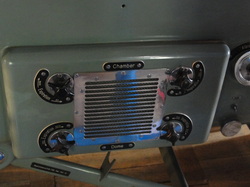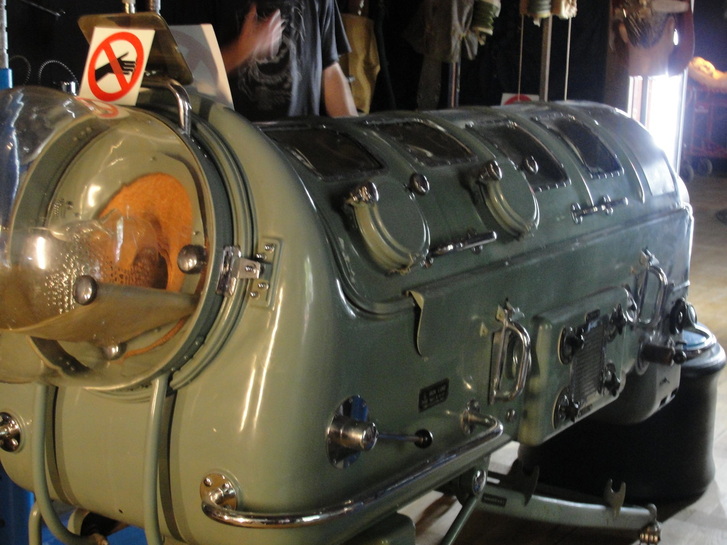
Do you recognize this machine? It’s an iron lung or basically a breathing machine. Using electricity, it causes the lungs to expand and contract manually. During the polio outbreaks of the ‘40s and ‘50s, rows of the medical devices lined hospitals, keeping patients breathing.
When my brother came to Berlin, we visited the Design Panoptikum Museum. During the tour, our guide asked us how long we thought someone could survive in one of these contraptions. Guesses ranged from a week to six months.
To our shock, one woman lived in her device for 60 years, only dying because the power went out.
What kind of life could you live if you were confined to an iron lung? It would seem pretty abysmal, dependent upon others for even the most basic needs, literally needing to be plugged into a power source at all times.
Contrary to what society might expect, people living in the lung have made incredible contributions both large and small – writing a book, hosting dinner parties, teaching university classes and even running a suicide hotline.
When we think of platforms, our minds often jump to the names of the powerful – the President, Miss America, the Donald Trumps and Angelina Jolies of the world. Those we see as superior to ourselves in prestige, power, beauty or success.
On the flip side, we are quick to give pity rather than a platform to those we judge as weaker than ourselves.
However, when we give the powerless a voice, it is the often their weaknesses themselves that make us stop and listen.
Imagine the shock of a suicidal teen, who realizes that he is talking to a woman who cannot even breathe on her own – and still sees life as worth living. Or the university student, who is in danger of dropping out, when she hears a lecture from a paralyzed, confined professor, who rose through the ranks of academia.
The thread of God choosing the weak and humble is consistent throughout the stories of the Bible. Nevertheless, the myth that becoming a believer in Christ means a life of health, wealth and prosperity still exists.
While it’s true that God does provide for our needs, He’s not an “easy button.” He knows that the “good life” can give us the illusion that we can do it all ourselves and cause us to distance ourselves from Him.
Instead He declares to us that his “power is made perfect in weakness” (2 Cor. 12:9) with His son Jesus Christ as the prime example.
Jesus, even though He had the status and power of God, “made himself nothing” (Phil. 2:7). He descended from the heavenly throne to earth and died an undeserved, cruel death, so that God’s power would resurrect Him, defeating death and bringing salvation.
While I have no desire to reside in an iron lung (or die on a cross, for that matter), I am challenged to leverage my limitations instead of wallowing in them. Even though it is perfectly acceptable to ask God to take away my shortcomings, I also need to consider how God’s grace and power might be displayed through that in myself which I most despise.
Are you willing to let your weaknesses show? Is there a something you are hiding that you should be standing on instead?
When my brother came to Berlin, we visited the Design Panoptikum Museum. During the tour, our guide asked us how long we thought someone could survive in one of these contraptions. Guesses ranged from a week to six months.
To our shock, one woman lived in her device for 60 years, only dying because the power went out.
What kind of life could you live if you were confined to an iron lung? It would seem pretty abysmal, dependent upon others for even the most basic needs, literally needing to be plugged into a power source at all times.
Contrary to what society might expect, people living in the lung have made incredible contributions both large and small – writing a book, hosting dinner parties, teaching university classes and even running a suicide hotline.
When we think of platforms, our minds often jump to the names of the powerful – the President, Miss America, the Donald Trumps and Angelina Jolies of the world. Those we see as superior to ourselves in prestige, power, beauty or success.
On the flip side, we are quick to give pity rather than a platform to those we judge as weaker than ourselves.
However, when we give the powerless a voice, it is the often their weaknesses themselves that make us stop and listen.
Imagine the shock of a suicidal teen, who realizes that he is talking to a woman who cannot even breathe on her own – and still sees life as worth living. Or the university student, who is in danger of dropping out, when she hears a lecture from a paralyzed, confined professor, who rose through the ranks of academia.
The thread of God choosing the weak and humble is consistent throughout the stories of the Bible. Nevertheless, the myth that becoming a believer in Christ means a life of health, wealth and prosperity still exists.
While it’s true that God does provide for our needs, He’s not an “easy button.” He knows that the “good life” can give us the illusion that we can do it all ourselves and cause us to distance ourselves from Him.
Instead He declares to us that his “power is made perfect in weakness” (2 Cor. 12:9) with His son Jesus Christ as the prime example.
Jesus, even though He had the status and power of God, “made himself nothing” (Phil. 2:7). He descended from the heavenly throne to earth and died an undeserved, cruel death, so that God’s power would resurrect Him, defeating death and bringing salvation.
While I have no desire to reside in an iron lung (or die on a cross, for that matter), I am challenged to leverage my limitations instead of wallowing in them. Even though it is perfectly acceptable to ask God to take away my shortcomings, I also need to consider how God’s grace and power might be displayed through that in myself which I most despise.
Are you willing to let your weaknesses show? Is there a something you are hiding that you should be standing on instead?

 RSS Feed
RSS Feed